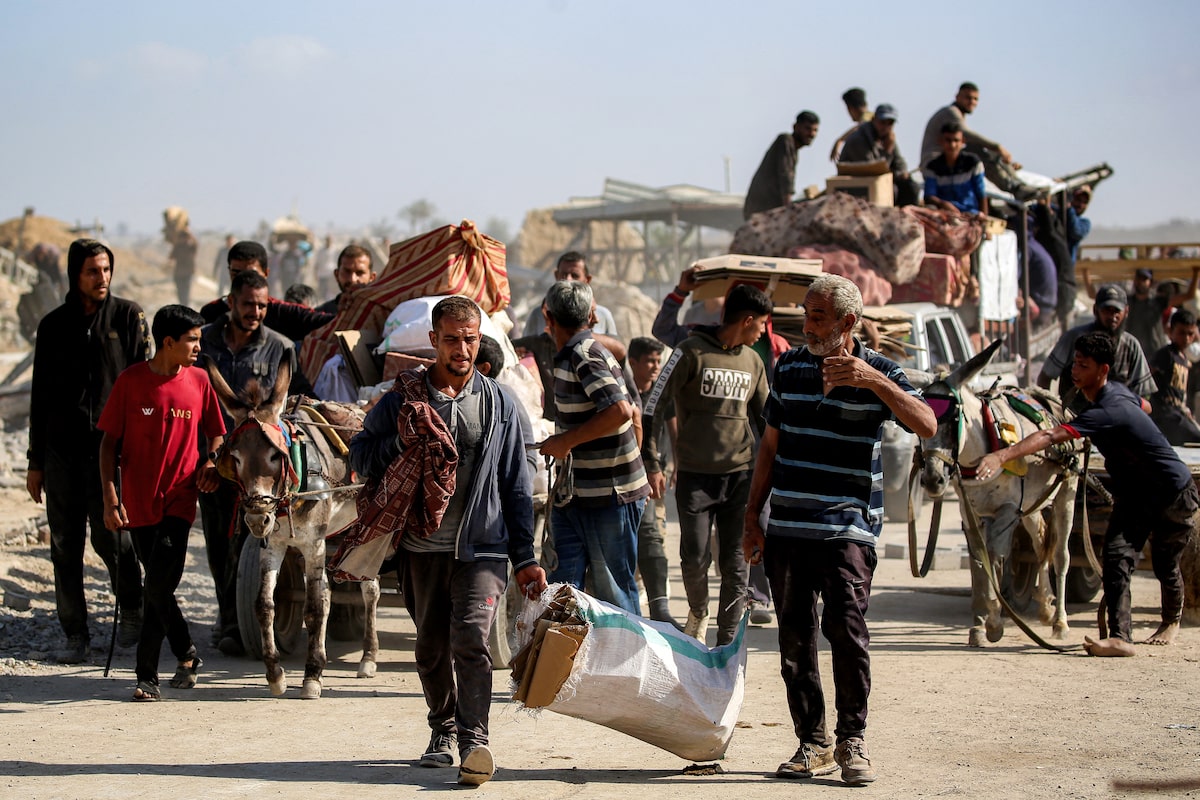People walk with aid packages received from a distribution centre run by the U.S. and Israeli-backed Gaza Humanitarian Foundation in the central Gaza Strip, on Tuesday.EYAD BABA/AFP/Getty Images
The American plan to end the Israel-Hamas war was met with both praise and anger across the Middle East – and no official reaction from Hamas, suggesting that peace is not imminent in the largely razed Gaza Strip.
Shortly after the 20-point plan was unveiled by U.S. President Donald Trump at the White House on Monday night, when it was immediately endorsed by Israeli Prime Minister Benjamin Netanyahu as a “critical step” toward ending the two-year-old war in Gaza, cracks appeared.
On Tuesday, Mr. Netanyahu’s far-right, ultranationalist allies attacked him for a plan that would end the war immediately; release the remaining Israeli hostages within 72 hours; disarm Hamas; release almost 2,000 Palestinians from Israeli prisons; not force any Gazans to leave the territory; and see the gradual withdrawal of Israeli forces from the strip. The Israeli military would be replaced by an international stabilization force and a new Palestinian police force.
Finance Minister Bezalel Smotrich, who has urged the Israeli government to “annihilate everything” in Gaza, called the Trump-inspired plan “a resounding diplomatic failure, a closing of eyes and turning our backs on all the lessons of Oct. 7, and in my estimation, it will end in tears. Our children will be forced to fight in Gaza again.”
He and National Security Minister Itamar Ben-Gvir had threatened many times to bring down Mr. Netanyahu’s fragile coalition government unless Hamas is eradicated.
Israeli PM Netanyahu threatens Hamas in event they reject plan, U.S. President offers full backing.
The Associated Press
Hamas militants triggered the war on Oct. 7, 2023, by attacking Israel, killing more than 1,200 people, mostly Israelis, and taking about 250 hostages. Most of the hostages have been released. About 50 remain in Gaza, of whom about 20 are thought to be alive. The Gaza Health Ministry says more than 66,000 Palestinians have been killed in Gaza in the past two years.
The foreign ministers of eight Arab or Muslim-majority countries – Egypt, Jordan, Turkey, the United Arab Emirates and Saudi Arabia, among them – were quick to endorse the plan.
But some politicians, clerics and analysts in the Arab world were equally quick to condemn it. They called it overly vague and unfair because neither Hamas nor the West Bank-based Palestinian Authority were involved in writing it.
They also said it relies on the possibly overly optimistic assumption that Israel will keep its commitments, even as the government continues to build settlements in the West Bank, which are considered illegal under international law, and broke a ceasefire agreement with Hamas in March.
Key points from the plan Trump has proposed for a ‘New Gaza’
“This plan is horrendous,” said Father David Neuhaus, the Israeli, South African-born Jesuit priest who teaches scripture in Palestine and Israel and is the former episcopal vicar of Hebrew-speaking Catholics. “They should give the Palestinians a say in their future. So far it’s ‘If you don’t do what we tell you to do, we let Netanyahu continue the war of destruction in Gaza.’ Peace means dialogue, and dialogue is not happening.”
Basem Kamel, the Egyptian senator and secretary-general of the small Social Democratic Party, called the peace plan “fundamentally flawed.” He said Hamas may not automatically agree to it unless it has some role in the future of Gaza.
“True peace cannot be built on unilateral conditions or on promises that past experience has proven to be unreliable,” he said in a written statement to The Globe and Mail. “Sustainable peace requires inclusiveness, justice, and genuine Palestinian participation in determining their own future, not merely a transitional administration under international supervision or Israeli security control.”
An Israeli army armoured personnel carrier moves along the border fence with the Gaza Strip in southern Israel.JACK GUEZ/AFP/Getty Images
Hamas has only told the Qataris, who have been key mediators in ceasefire talks, that they would “review the plan in good faith.” Several reports in the Middle East and in Western media have said Hamas may not formally respond for several days.
Mohamed El Oraby, a former Egyptian diplomat who was ambassador to Germany, said a lot of details in the plan need to be worked out. “The problem now is the weapons of Hamas,” he told The Globe. “I doubt they will surrender their weapons immediately.”
In comments made to members of the Jerusalem Press Club on Tuesday, Ofer Guterman, senior researcher at the Institute for National Security Studies, said the plan puts Hamas in a terrible position because it denies them any military or political role in the future of Gaza, only assuring them of safe passage out of Gaza if they give up their weapons.
For volunteer paramedics in Gaza, every lost second can mean a lost life
“I don’t see why Hamas would need to say yes to this initiative,” he said. “And it would be hard for Hamas to say a strict no. The most likely response would be yes … but.”
In the meantime, Mr. Netanyahu has made it clear that he will never agree to the creation of a Palestinian state, even though paragraph 19 of the plan calls for a “credible pathway to Palestinian self-determination and statehood.”
In a video statement on his Telegram channel, he also said Israeli forces “will remain in most of the territory,” though he did not say for how long. The peace plan states that “Israel will not occupy or annex Gaza” and will withdraw once milestones based on demilitarization are achieved.
Relatives of hostages held by Hamas voiced cautious optimism after listening Trump presenting his Gaza plan.
Reuters

